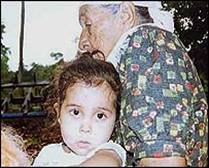|
|
Colombia's Ghost Towns
By Elliott Gotkine, BBC News
July 8, 2004

BBC Photos
According to the UN, there are up to three million internally displaced people in Colombia, making it the worst humanitarian crisis in the western hemisphere.
La Union Peneya used to be like any other isolated settlement in rural Colombia. Rows of grey shacks with corrugated-iron roofs line the muddy-brown paths which criss-cross the village. It is surrounded by a seemingly infinite expanse of rolling green fields.
But all that changed on 4 January this year, when it became Colombia's latest ghost town.
The people who lived here were driven out of their homes by the left-wing guerrillas of the Revolutionary Armed Forces of Colombia (Farc) and forced to find refuge in the surrounding villages and towns.
But not everyone joined the exodus.
Eerie Place
The youngest is three-year-old Stefania, a sweet, smiling child with big, brown eyes and a much-abused plastic doll as her only friend.
Her mother - who died two years ago - raised Stefania alone, which is why she is cared for by her 80-year old grandmother, Ana Francisca, and her great-grandmother, Paula Diaz, aged 102. They have lived here for the best part of 50 years.
"In the middle of the night, one Sunday, everyone left," recalled Paula Diaz. "No-one told us anything."
I asked them why they did not just hitch a ride on the army helicopter which regularly drops supplies and troops into the village.
"The truth is we don't have anywhere to go," Grandma Ana Francisca told me. "If we had a property somewhere else, we'd have already gone there. But how we can leave this place, which is ours, to go somewhere where we'll have nobody who can pay the rent for us? We're resigned to dying here."
The village itself is an eerie place. Bakeries still have bread on the shelves; brightly-coloured children's bicycles lie abandoned by the roadside; and blue, pink and yellow Christmas decorations brighten up its now deserted streets.
A world away, in the capital, Bogota, Colombia's palatial Constitutional Court recently ruled that the government was failing in its obligations towards the country's internally displaced people.
Colombia's ghosts, it seems, will not be laid to rest for some time yet.
|

|
|




![]()